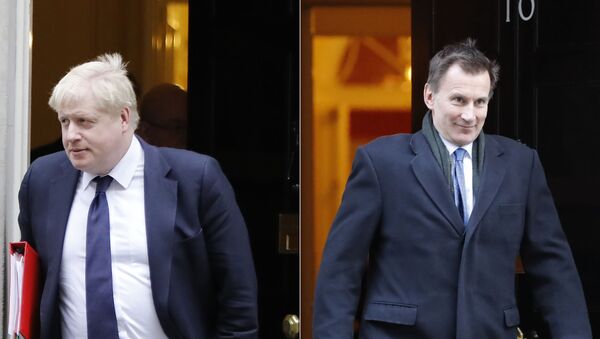A live ITV event on 9 July brought the two remaining contenders to replace outgoing UK Prime Minister Theresa May - Boris Johnson and Jeremy Hunt - together to thrash it out over such issues as Brexit and the Kim Darroch leak, as they seek to win over the Conservative votes required to propel them to 10 Downing Street.
As the two candidates’ first head-to-head leadership debate unfolded, the scandal around the UK ambassador and the reactions of both candidates took centerstage over traditionally heated issues such as the two hopeful’s handling of Brexit.
The British Foreign Office recently announced that its ambassador to the US, Kim Darroch, had resigned following the scandal over a leak of the embassy's cables.
The leak, published in the Daily Mail, suggested that the envoy branded US President Donald Trump as "inept and incompetent" and his administration "dysfunctional, unpredictable [and] diplomatically clumsy".
Following the publication, Trump slammed him on Twitter, warning that his administration is not "thrilled with a very stupid guy" appointed as the UK ambassador.
Regarding the scandal’s impact on the fight to succeed Theresa May as the campaign reaches the home stretch, Dr Martin Farr, Senior Lecturer in Modern and Contemporary British History at Newcastle University, failed to see it having much sway.
The resignation is a totally remarkable situation, he said, which has been brought about by, first of all, the leaking of this confidential memoranda to London, anti-appropriate comments on his host government; secondly, by Donald Trump’s public objection to the ambassador and to what he said, which itself is remarkable.
Thirdly and crucially, says Farr, evidence suggests we have this ambassador’s own words from his team that when Johnson refused to support him in Johnson and Hunt’s first TV debate, the ambassador felt he had to resign.
The fact that Johnson, who is expected to become the next PM, didn’t support the ambassador was one of the reasons he stood down, says Dr Farr, as he added that effectively, the next PM sided with the foreign government over one of his own representatives in what is an extraordinary situation.
Another expert, David Collins, professor of international economic law at City, University of London and author of Negotiating Brexit: The Legal Basis for EU and Global Trade, said it appears as though Boris Johnson is poised to become the new PM as he is generally more well liked by the Conservative Party membership and has been more explicit about how he will respond to Brexit.
His rival Jeremy Hunt, says the expert, gives the impression that he will offer more of Theresa May’s failed policies, as he has spoken of renegotiating the Withdrawal Agreement, which the EU has said they would not do.
On other policies, Jeremy Hunt failed to distinguish himself as foreign secretary, and recently come down against the US in relation to the ambassadorial controversy, suggesting that a US free trade deal would be more problematic under him, said Collins.
Boris Johnson would make the better PM and that is why he will be chosen in the next few weeks, the expert summed up.
The final stage of the Conservative leadership election is now under way with party members having received their ballots.
As Theresa May officially resigns as PM on 24 July, the 160,000 strong membership of the UK Conservative Party will choose between Boris Johnson and Jeremy Hunt to determine who becomes the next UK prime minister.
Johnson has long been the clear favourite in the contest, with YouGov polls surveying party members, ConservativeHome’s surveys of its readers, and polls of the party’s councilors all pointing to a landslide win for the former mayor of London. The winner of the contest is to be announced on 23 July and will take over from Theresa May a day later.
*Views and opinions expressed in this article are those of Jon Gaunt and do not necessarily reflect those of Sputnik



